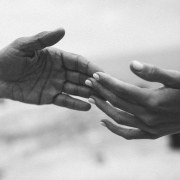How Grace Deepens Progress: Big Questions Institute
How Grace Deepens Progress
|
|
While educators heave to the finish line of a grueling year, with particular challenges stemming from the “growing pains” or cultural battles of working for justice, equity, diversity and inclusion (JEDI), we have been struck by the schools where progress and support have remained in tact (or built momentum) for vital JEDI efforts. As we reflect on lessons learned from schools we work with around the world, one of the elements that stands out, but is rarely discussed, is grace.
We see grace manifest in many ways, at multiple levels. It might be considered an extension of empathy, favor, approval, mercy, reprieve, compassion or thoughtfulness, among its various definitions and implications. Its practice takes a clear vision and commitment, and it seeds a culture of honesty, courage, and learning.
Grace is not to be associated with the toxic positivity of “get over it,” “positive vibes only” or silence in the face of real harm, marginalization, or “othering” that too many staff and students might experience regularly. It’s an active choice, and it manifests in various ways, including:
- Always learning: Grace recognizes you don’t know all you need to know to be a JEDI champion. You’ll say the wrong thing. You’ll say too much or too little. But we are all learning, always learning. If the commitment to stay in a posture of learning and do the work exists, you can make mistakes and try again. You might also recognize that a person who is stumbling might be striving to learn and offer alternative language or perspective.
- Complexity: While a school can take a stand for what it believes in, it can also encourage sincere problem solving, genuine contrition, and efforts toward correcting and learning. The complexity reflects values of cooperation and growth mindset. This means that individuals who create unintended harm AND are sorry that they did so, with efforts to right their wrong and a sincere apology and actions, can get another chance. People aren’t canceled.
- Calling In, Calling Up, and Calling Out: When you’re not reflexively canceling people in a quest for justice and equity, your communication options shift. You can take an approach of “calling in” (as in, let’s explore more deeply, make meaning together, and find mutual understanding across differences), or “calling up” (as in calling up to one’s noble and unlimited potential, using imagination to create a new solution or situation). Where grace is present, “calling out” can be used sparingly, too – particularly when an individual needs to know that their words or actions are unacceptable and will not be tolerated, and trauma to other individuals must be prevented). This is not a “calling out culture” which is more like a “cancel culture,” but an understanding that calling out can create safety, too.
- Recognition: Recognize staff and students who have maintained their commitment to anti-racist/anti-bias efforts, even as most others become too busy to keep going, or move on to the next “shiny object” or interesting initiative. These are usually individuals who have been marginalized themselves, and have been shouldering many of the burdens of JEDI work, long before it was widely discussed. Recognition might take the form of an honorarium for extra committee work, crediting time off for the extra hours put in, or even an invitation to a special event in your community (if it interests them).
- Slowing down: Grace finds its way when otherwise automatic processes slow down. This might look like taking a few breaths before responding to an incendiary comment, or pausing before speaking in a meeting to make room for more voices, or slowing down a disciplinary process to hear the full story, and check your biases. It might look like taking the time to ask more questions in a board meeting, notice whose voices are absent, and remember that equity and belonging represent core responsibilities, not “add ons” for those at the margins.
As we look forward to a much needed summer of hope and healing, consider how grace figures into your self-care as well as the kind of equity leader you hope to be. Where does grace “live” in your school? In your daily life? How might it be woven into the fabric of belonging at your school?
We’d love to hear your thoughts to these questions.
Homa and Will




Leave a Reply
Want to join the discussion?Feel free to contribute!